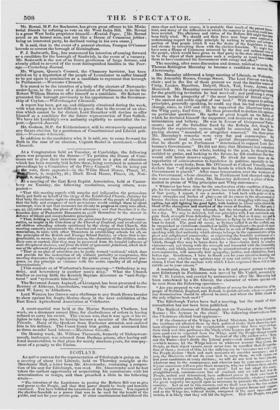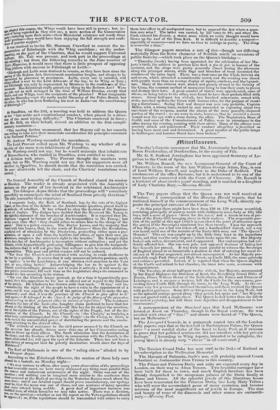SCOMAND.
An active canvass for the representation of Edinburgh is going on. At at meeting of about 150 Liberals, held on Thursday sennight at the Merchants' Hall, a letter from Mr. Abereromby, containing a resigna- tion of his seat for Edinburgh, was read. Mr. Abercromby said he had
• taken the earliest opportunity of acquainting his constituents with his determination to resign, and then preached a little in the following strain-
" The intention of the Legislature in passing the Reform Bill was to give real power to the People, and that that power should be freely and honestly exercised. You have fulfilled the intentions of the Legislature. You regarded the elective franchife as a power that was to be used for the benefit of the and not for your private gain. If other constituencies had followed the
sane clear and honest course, it is probable that much osfiftioe:pesreda tent, and many of the difficulties in which theseeeokuitilitgrytois been avoided. The efficiency and virtue of the Reform been fairly tried. We should not then have seen lame sum undermining respect for public principle by Bill thigh': t°gtli:In-i"rt:Itu'D e'snd,":101-d:e41"; portion of that people which it was the desire of the Legisl tumevutisrlute,.":11. and elevate by intrusting them with the elective franchise. -Wak (Ire have seen a House of Commons returned by the free and unbia.smsedi the people, which would have given to that party in time state whi h‘suasissiee to be the object of their preference such a majority asttewotuoldslullaceeued—an,m: them to have conducted the Government with energy and effect." ve en -- Thomas Babington Macaulay to become a candid.
The meeting, after some discussion and demur, reiolved to " Abercromby.
chair ; and in the list of those present we read the familiar names ther in the Assembly Rooms, George Street. The Lord Provost was Craig, Lauder, Hamilton, Dalyell, Black, Tait, Mr. Macaulay addressed a large meeting of Liberals, on e (it o lu min Moncrieff. Mr. Macaulay cotnmenced his speech by expressing thaalinka for the gratifying invitation he had. received ; and professing a strong interest in the prosperity of " the most beautiful of British cities" ° " the ancient and noble capital of our land." With respect ,to politiea principles, generally speaking, he could say that his had undergone no
change, since, in 1831 and 18:32, he supported the illustri o
ous leader of the Whig party, Earl Grey. He then proceeded to declare his opinions on particular questions. He spoke at great length on the Ballot, of which he declared himself the supporter, and descanted on the evilsof intimidation and bribery. He was in favour of Quinquennial Parh_ ments; and of the franchise fixed by the Reform Act, though he thought the registration system might be amended, and the Rate. paying clauses " amended, or altogether removed." On these points Mr. Macaulay's remarks were very flat and commonplace Ile then, amidst loud cheers and " partial disapprobation,' declared that lie should go to Parliament " determined to support Lord Mel- bourne's Government." Ile did not deny that Ministers bad committed great faults ; but, on the whole, looking to the past, he thought them entitled to praise, and looking to the future, he felt confident that they would still better deserve support. He dwelt for some time on the superiority of administmlion to legislation in polities; epeeially in Ire- land, where everybody, from Mr. O'Connell to Colonel Conolly, weld declare that " all depends upon the hands in which use Administrative Government is placed." After sonic lamentation over the weakness ef the Government, whose situation in Parliament had changed soadleyefloat the worse since h them, e left em, Mr. Macaulay delivered a piece f d matimi in praise of Whig principles and Whig statesmen- " Whatever has been done for the amelioration of the condition of the pee- pie, for the modification of the penal laws, has been mill done by that party tend of that ratty, I repeat, I tun a member. I look back with pride on alibi many struggles and flashes of glory—on all its career in the advancement of human freedom and happiness • and I have sects it struggling with many dill. (+hies, but still fighting the good fight, with leaders in whose veins glcon4 the blood dile chnmpions and martyrs of the cause of freedom. To thnt party I am attached. Delusion may triumph, but the triumphs of delusion are Ind for a day. We may be defeated, but our principles will, I am convinced, onlr gain fresh strength from defending them But be that as it may, toy part?i taken, and while one shred of the old banner is flying by that banner will I d least be thund. The good old came, as Sydney called it on the scaffold, may be vanquished or victonowl—insulted or boldly t riumphant—the good old cam is still the good old causetvith me. Vi hether in or out of Padiatnent—whefixt speaking with that authority which always belongs to the representative of ibis great and enlightened community, or expressingethe humbler sentiments of s private citizen—I will to the last maintain inviolate nty fidelity to principle's which, though they may be borne down for a tinw—borne down by senseless clamour—are yet strong with the strength and immortal with the immortality of truth ; and which however they may be misunderstood or misrepresented by contemporaries, will assuredly find sympathy, justice, and admiration, from a better age. Gentlemen, I have to thank you for your attentive hearing, and to assure you, whether my opinions may or may not entitle me to your five chises, I trust that the candour with which I have expressed them will at loth entitle ate to your esteem."
A resolution, that Mr. Macaulay is a fit and proper person to repre- sent Edinburgh in Parliament, was moved by Mr. Cadet], seconded by Sir '1'. 1). Lauder, and carried by acclamation ; after Mr. Macaulay lad been catechized by a Dr. Glover, the character of whose queries will be seen from the following specimen— •
"Are you prepared to vote twenty Millions of money fiii the education of the people of Scotland, England, and Ireland, in parish-schools, where Ito pried of any denomination should be allowed to enter, and where the Bible should bo the only religious book used "
The Edinburgh Tories have had a meeting, but the result of theis consultation has not been been published. The Radical electors of Edinburgh met on Tuesday, at the Waterloo Rooms ; Mr. Avtoun in the chair. The following observations front the Chairman elicited loud applause-
" If the character of the Whigs, as Liberal Ministers, Ins been injured by the insidious aid afforded them by their political rivals, their characters bare them their tone and their conduct. Instead of the silly cuckoo notes, 's (‘.re,p have reemved front
been altogether ruined by the svcophantish support they
their thick and thin partisans—the hack-white keepers out of the Tories. No more good can be expected from the Whigs until the People change towyds out the Tories—don't divide the Liberal party—sink minor difference , —which means, let the Whigs behave in whatever manner they please, the People, as their abject vassals, must never dare to manifest their iliiapp,rabis7 tion of them ; instead of this, let the rallying-cry be measures not men the People declare Such and such measures we consider necessary ; amiil if you, the Ministers, will not do your best to carry them, we will oppose and your candidates at every election ; we will do our best to tura you oar. whatever may be the consequence, and whoever may be your successors; ,e1,10,1 if your successors will not pass those measures, why, we will turn them out, al, until we get a Government to our mind.' Let us but adopt this_narl,le straightforward, common-sense line of conduct, and we will find People, united and determined, have sufficient power in their own limes:IL cause to be carried peacefully, legally, and constitutionally, whatevelf.,ne the great majority are agreed upon as necessary to promote the wel ; rcectr.th_t_ toiTtl country. Let its act in this manner, and we shall soon have the two . of the aristocratic party bidding against other for popular favour and soppy.. and as the Whigs are, without doubt, composed of the most squeetaih.ole. a_ terials, it is likely that they will bid the highest. Had the People, two sari
. .
adopted this course, the Whigs would have been still in power ; but, in- '5e;a1 of being regarded as they now are, a mere section of the Conservative it-tottenng upon their seats—their Ministerial existence not worth three oje parehase—they would have been enjoying the full strength and confi- dence of popular support." it was resolved to invite Mr. Sharman Crawford to contest the re- presentation of Edinburgh with the Whig candidate ; on the under- standing, on the part of the Chartists, that he would support Universal liffrage. Mr. Tait was present, and took part in the proceedings at al; meeting ; but from the following remarks in the June number of inditn„slagazine, it would seem that there is little prospect of opposing triiig jobbers with success in Edinburgh or Leith- apainhurgh and Leith seem destined to remain, as they have been since the wasp of the Reform Act, Government nomination burghs, and always to be hresented by placemen or pensioners. Leith, every one is satisfied, will elsavs afford a seat to the Lord Advocate of the day, be he Whig or Tory ;
ta i
laburgh can only be represented by Members n the confide/ace of Go- Jas Edinburgh really gained any thing by the Reform Act ? Were 0, feta not as well managed in the time of William Dundas, except that Tones, and not Whigs, were the recipients of the plunder? What imaginable skim has Macauley—not the really useffil Maeauley of the Police Board, but &other, he who has been feathering his nest in India—on the constituency sf Edinburgh ? "



























 Previous page
Previous page